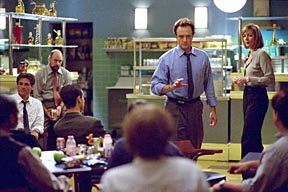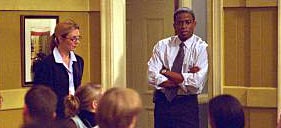- Writer: Aaron Sorkin, Director: Christopher Misiano
- Takes Place: Unknown
- Broadcast: October 3, 2001
- Query: What are the stories of Isaac and Ishmael as told in the Judeo-Christian and the Moslem traditions?
- Query: Can you cross into Vermont from Ontario, Canada?
- Query: What was that music at the end?
 From "Isaac and Ishmael" -- Pictured: (l-r)
Rob Lowe as Sam Seaborn, Richard
Schiff as Toby Zeigler, Bradley
Whitford as Josh Lyman, Allison
Janney as C. J. Cregg
From "Isaac and Ishmael" -- Pictured: (l-r)
Rob Lowe as Sam Seaborn, Richard
Schiff as Toby Zeigler, Bradley
Whitford as Josh Lyman, Allison
Janney as C. J. Cregg
Warner Bros. photo |
- During a "crash" ("means there has been some kind of security break: No one in or out of the White House"), Josh talks to some high school students who had won a trip to the White House through Presidential Classroom. Josh assures them that there is nothing to worry about. "We've been having these crashes once a week." Most of the security problems, it seems are due to Islamic extremists. But Josh emphasizes that the problems are not due to Muslims in general. Josh gives these high school students an SAT kind of question:
- "Islamic extremist is to Islam as _______ is to Christianity."
After hearing from the students, Josh writes down his answer: "KKK. . . . It's the Klan gone medieval and global. It couldn't have less to do with Islamic men and women of faith of whom there are millions and millions.Muslims defend this country in the Army, Navy, Air Force, Marine Corp, National Guard, Police and Fire Department."
- When he runs out of other things to say, Josh calls in friends. First up:Toby.
- "...there's nothing wrong with a religion whose laws say a man's got to wear a beard or cover his head or wear a collar. It's when violation of these laws become a crime against the state and not your parents that we're talking about lack of choice."
He goes on to say that "The Taliban isn't the recognized government of Afghanistan. The Taliban took over the recognized government of Afghanistan. . . . When you think of Afghanistan, think of Poland. When you think of the Taliban, think of the Nazis. When you think of the people of Afghanistan, think of Jews in concentration camps."
Toby then goes on to tell a story told to him by a friend of his father's who had been in a Nazi concentration camp. "He said he once saw a guy at the camp kneeling and praying.
He said 'what are you doing?'
The guy said he was thanking God.
'What could you possibly be thanking God for?'
' I'm thanking God for not making me like them.'"
Then Toby says, "Bad people can't be recognized on sight. There's no point in trying."
- Later a student asks Sam:
- "...what do you call a society that has to just live every day with the idea that the pizza place you are eating in could just blow up without any warning?"
"Israel," Sam answers.
- When C.J. joins them, Josh introduces her by saying:
- "C.J. has a bizarre affection for the intelligence community."
C.J. comes back with "We need spies. Human spies. . . . It's time to give the intelligence agencies the money and the man power they need."
- Meanwhile Leo takes part in the interrogation of an Arab American whose name corresponded to a name given by a terrorist who was caught entering the country from Canada. There are some circumstantial indications that the man, who is on the White House staff, may not be totally loyal to all U.S. policy in the Middle East.
- The young man says, "It is not uncommon for Arab Americans to be the first suspected" in terrorist activities like bomb threats. Leo, being so very protective of the President and the Presidency as well as the country, isn't sympathetic.

- Josh's parting advice to the students on how to relate to the terrorists is:
- "...remember pluralism. You want to get these people? I mean, you really want to reach in and kill them where they live? Keep accepting more than one idea. It makes them absolutely crazy."
- Leo has to face some pretty unpleasant things about his responses to all this. At the end he is so confused and embarrassed that his apology is some of the most realistic dialogue ever written. It is so realistic that like much of what each of us says when we are under a great deal of emotional distress, it is nearly incoherent.
- What is the media writing about this episode (note most news organizations only make their stories available for a short time so these links may not work for more than a couple of weeks or so)?
Dorothy Blinco told us about this one: Columbus Dispatch review by Tim Feran Dispatch TV-Radio Critic - He didn't like it.
The Washington Post:
'The West Wing' Assumes the Role Of Moral Compass by Tom Shales
MSNBC: A 'West Wing' on terrorist
attacks By Frazier Moore (AP) - He did like it
CNN: West Wing' probes nation's fears - Same story as the one above this
BBC: West Wing terror show criticised - Reporting on the criticisms of the episode
Time:
'West Wing': Terrorism 101
NY Post: 'WEST WING' WIMPS
OUT ON TERROR by Adam Buckman
Hollywood Reporter: Third-season premiere of 'West Wing' brings big numbers
Atlanta Journal: 'West Wing' offers somber civics lesson By Jill Vejnoska
Special 'West Wing' Wins Popular Vote, Aids Running Mate (LATimes by By BRIAN LOWRY)
E Online: Viewers Flock to Preachy"West Wing" by Mark Armstrong -This story quotes other stories, saying "Here's what others had to say:"
- In typically understated fashion, the New York
Post headline screamed "West Wing Wimps
Out on Terror." "The liberal Democrats of The
West Wing took on terrorism last night--and did
little but make pompous speeches," writes Post
TV scribe Adam Buckman. "Sorkin made sure that
most, if not all, of the bases were covered, but he
barely mentioned the military."
- " 'Isaac & Ishmael' contained more insight into
'America's New War' than the windstorm of
opinion on U.S. TV since the catastrophe," says
Toronto Star columnist Antonia Zerbisias.
Orlando Sentinel columnist Hal Boedeker called
the episode more "pedantic than dramatic" and,
although Sorkin's attempt was bold, "The results
were like a highfalutin after-school special, with
the viewers talked down to like those students in
the White House cafeteria."
- New York Daily News columnist Eric Mink was
impressed: "In a very real way, Sorkin and his
team--producing this episode on an astonishingly
tight schedule--provided a service similar to the
one David Letterman did for his fellow comics and
late-night TV hosts: They demonstrated that it is
possible to deal with terrorism in a fictional
drama, possible to do so in a sensitive, sensible
and intelligent way and possible to do it now."
- "A crashing and often condescending bore,"
writes USA Today's Robert Bianco. "You could
be forgiven if you began to fear that a quiz would
be given at the end of the episode."
- For anyone interested in guest stars of this episode (or any other), let us recommend the listing at The West Wing Episode Guide.
|
"Isaac and Ishmael"

 Home
Home